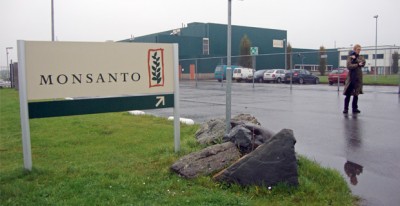Monsanto’s Experimental Genetically Modified Wheat Discovered in Montana

Image Credits: Wiki Commons
Monsanto’s experimental genetically modified wheat has been discovered growing in a second US field in Montana, about a year after the discovery of the company’s unapproved crop growing in Oregon disrupted US wheat exports.
The plants were discovered at a test site at Montana State University, where back in 2000-2003 Monsanto was conducting field trials of its wheat, genetically modified to tolerate Roundup herbicide.
Although the government believes the wheat never reached market, it has still opened an investigation into finding the rogue plants at a site that was not supposed to host any tests after 2003, USDA’s Department of Agriculture’s Animal & Plant Health Inspection Service announced on Friday.
“We’ve now opened an investigation into this regulatory compliance issue,” said Bernadette Juarez, director of investigative and enforcement services for APHIS, adding however that “there are no safety issues with this wheat.”
The last such discovery in Oregon led to several international customers postponing US wheat deliveries, but this time exports should not be affected, US officials believe. “We remain confident that the wheat exports will continue without disruption,” Juarez said.
US industry leaders also hope that exports should not be hurt by the discovery of GMO wheat in Montana.
“We are in the process now of informing our international wheat buyers,” Alan Tracy, president of US Wheat Associates, said in a statement. “We do not expect any disruption in sales.”
The new incident site is smaller than the one found last year, USDA said, around 1-3 acres compared to over 100 acres of GMO crops found in Oregon. The wheat strains in the two incidents differ, but both are resistant to Monsanto’s Roundup.
Meanwhile the Oregon incident probe has been closed – despite USDA’s failure to track down the source of contamination even after conducting 291 interviews with farmers and researchers.
“My program undertook one of the most thorough and scientifically detailed investigations in the history of our organization,” Juarez said. “Ultimately we were not able to make a conclusion as to how it happened.”
The government still has no clue as to how the wheat got in the field, and direct links to Monsanto could not be traced, so the agricultural giant will not face any penalties or disciplinary action.
Critics accuse Monsanto of failing to protect the market from contamination with experimental plants, as the billion-dollar St. Louis, Missouri-based agriculture company has for years been determined to enter the market with the first GMO variety of the crop. Genetically-modified wheat isn’t legally approved anywhere in the world, and international buyers threatened to boycott US wheat if the product was introduced.

